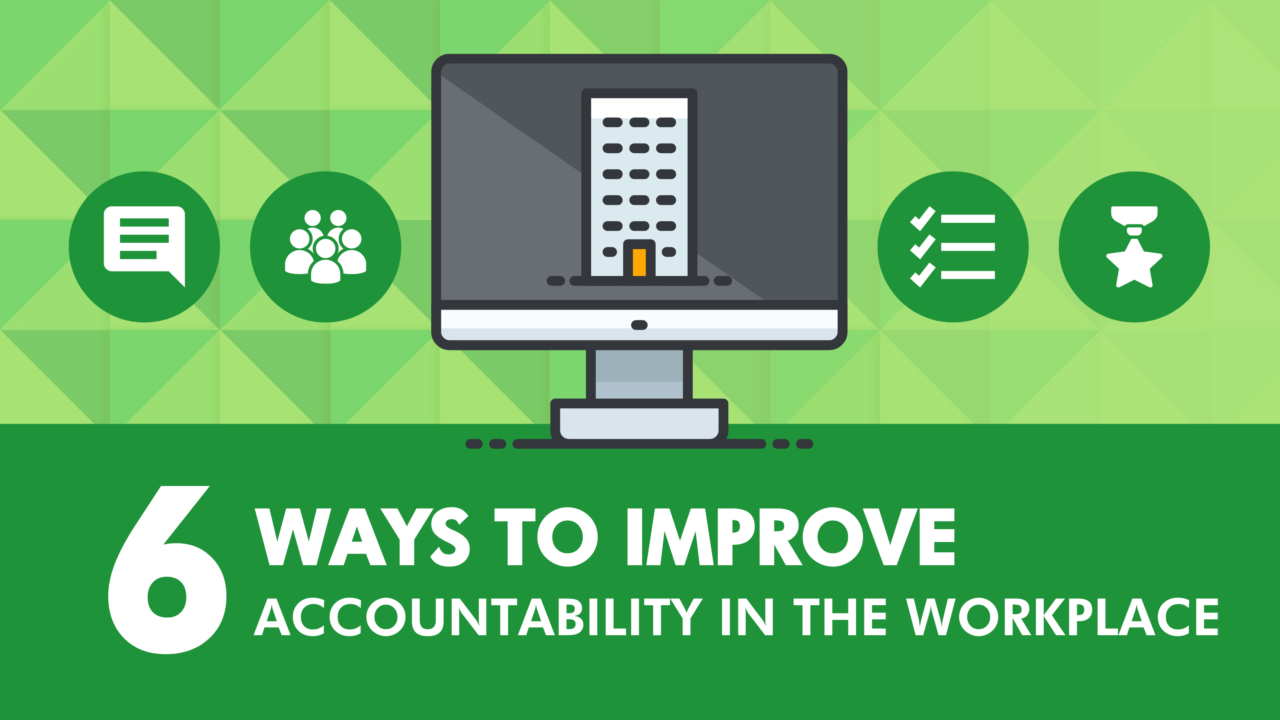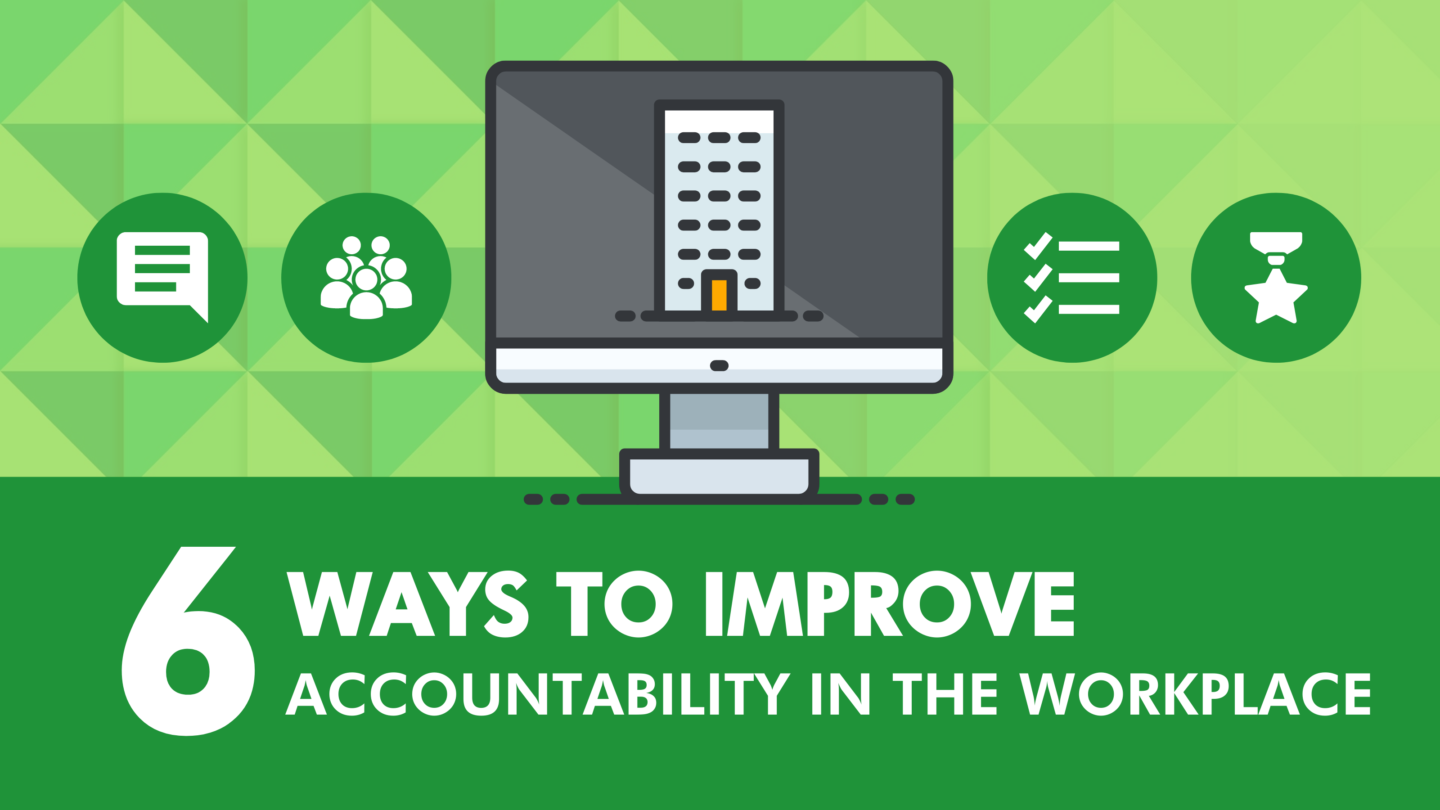
6 Ways to Improve Accountability in the Workplace
Accountability in the workplace (which is different than responsibility) is an important aspect of any company culture – not just for the leaders, but for all members of the team.
Accountability is essentially a designation as to who has to report on (or give an account of) a situation after it has occurred. This task should be assigned to one specific individual, based on their skills and competencies and how they align with the demands of the task itself. This person will be held accountable for the results and output of whatever the situation may be, and could be liable to face consequences if the needed results aren’t produced.
What happens without accountability in the workplace?
A lack of accountability in the workplace damages the entire team. If people are showing up late, missing deadlines, submitting subpar work, and so on, on a regular basis, these poor work practices begin to become the norm.
Especially in the current business climate, many employees are likely falling short of previous expectations. This could be because of unfamiliarity in working remotely, or even a newfound sense of autonomy that comes from initiative-based work. However, if employees who fall short of organizational expectations are not consistently held accountable for their mistakes, it sends a message to other employees that their behaviors can be excused.
When accountability in the workplace is not rigidly controlled, several issues can arise, including:
- Individuals/teams not meeting expectations. Expectations set by team leaders, such as project deadlines and scheduled times of work, should be consistently reiterated to all employees. If a team member regularly shows up to work ten minutes late and is never held accountable for it, they will assume that it is passable behavior. The same sentiment applies to deadlines – without accountability in the workplace, an employee will treat all deadlines as ‘soft deadlines’, not applying the amount of discipline required to complete them on time.
- Snowballing issues. Lack of accountability in the workplace can cause issues (that would have otherwise been solved easily) to snowball. For instance, in many projects, certain tasks have to be completed before others can get their duties finished. If one part is delayed – perhaps because the person responsible for it is late every day or putting in subpar effort – it could easily delay the next step, which would delay the one after that, and so on.
- Frustration among the team. If a specific individual is consistently not being held accountable despite causing delays and challenges for the rest of the group, it can cause many of their coworkers to be frustrated and lose faith in their leaders. Being unable to complete your work because someone else isn’t putting in the effort will lead to low team morale, less engagement, and a loss of trust in the systems that should exist to discipline such behaviors. A lack of accountability in the workplace leads to an overall emotional and professional disconnect, with unclear priorities existing throughout the whole team.
These are just a few main examples of the fallouts of a lack of accountability. Now that we’re aware of them, how can we endeavor to improve accountability in the workplace?
6 Tips to Improve Accountability in the Workplace
1. Lead by example
The easiest way to improve accountability in the workplace is to hold yourself accountable. As a leader, you cannot be showing up late for meetings or missing deadlines yourself. If you complete your tasks by the predetermined date, arrive on time and ready to any meetings you’re a part of, and take it upon yourself to support your team in whatever way you can, you’ll be setting a great example of accountability for your team. Especially in the current times, setting a standard for what is expected can provide a clear example to the rest of your team of work should look like, giving them a frame of reference if they are struggling to adapt to remote work.
2. Give solid, clear feedback – often
Giving feedback to employees is one of the most important things a manager can do. Consistent feedback is critical, meaning all forms of constructive criticism and encouragement should be delivered in a timely manner, using clear and concise words. Giving feedback often will not only make it easier to give constructive criticisms when necessary, but it will help ensure employees aren’t surprised by what they’re hearing. If they have a clear overview of the direction they’re headed, with consistent check-ins that remind them of ways to stay on track, constructive criticisms will be viewed as helpful, rather than an unpleasant surprise. It’s also important not to wait too long to give the feedback. If someone is going off track, or not performing to the standards expected of them, it’s better to nip the issue in the bud. Knowing they’ll need to answer to you for the actions they perform will help raise accountability in the workplace.
3. Hold each other accountable
As a manager, it’s your job to hold your team accountable. However, that doesn’t mean they can’t strive to hold each other – and you – accountable as well. A good way to improve accountability in the workplace is to assign everyone action items whenever there is work to be done. Doing this at team meetings will let everyone know who is accountable for what aspect, which will spur the team to complete their specific tasks. Vocalizing your goals and promises (i.e. to give feedback a certain amount of times per week) will also help hold you accountable, contributing to your effort to lead by example.
4. Have the tough talks with team members
In addition to giving regular feedback to your employees, you need to hold them accountable when they do something wrong. Many managers dread these conversations, but they don’t have to be (nor should they be) negative lectures on the individual’s character. Instead, aim to focus on the issue itself, rather than the person. You should also avoid placing immovable blame, and try to understand why something happened the way it did. Asking questions and gaining insight into the employee’s perspective on why a certain result occurred is a good way to do this. By keeping an open dialogue with them, you may also be able to pinpoint other reasons for inadequate work, such as personal issues or lack of training.
5. Consider how your employees view things
Most people aren’t trying to be difficult. If someone is doing something wrong, they may not even know it’s affected the team negatively. Generally, people are not aware of how their actions or behavior impact others. Approaching them and explaining this to them is a good way of improving their personal accountability in the workplace. It may be a simple misunderstanding or an easy issue to solve.
6. Set clear, achievable goals
If everyone knows what the overall goals are, and their role in achieving them, it will be easier to hold them accountable. This, paired with constant check-ins and follow-ups, will lead to more success for the individual and ultimately the team.
Final Thoughts
Improving accountability in the workplace should be a consistent effort for team leaders no matter the state of the organization. If signs are pointing to a lack of accountability – i.e. subpar behavior accepted as the norm, disengaged employees, etc. – you’ll need to take steps to improve it. Many companies are likely facing challenges of holding their employees accountable in the current times, as navigating new methods of work and team management means methods of discipline don’t hold as much precedence. However, keeping a clear sense of what is expected of your employees will actually help to encourage the speed at which your organization can adapt to this new way of working. When all members of the team have a transparent insight into what is expected of them, and are made aware of the repercussions should they fall short of these expectations, you can keep your entire team on the right track. The tips mentioned above will help get you started, but the rest is up to you.






